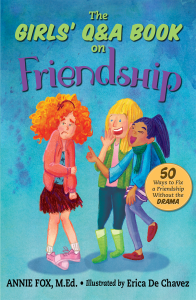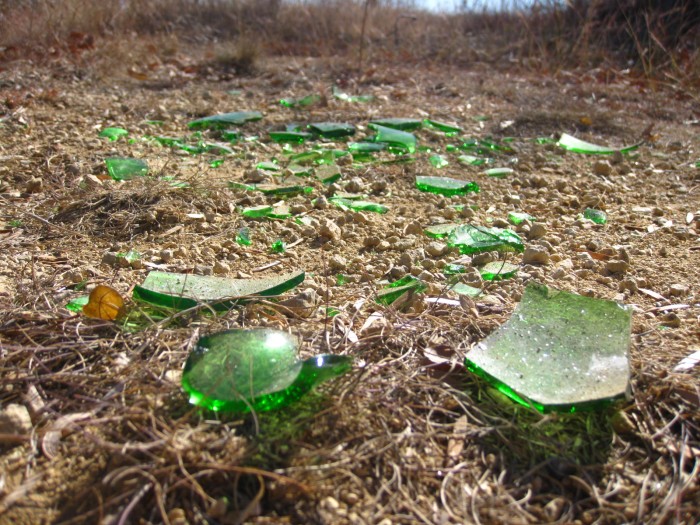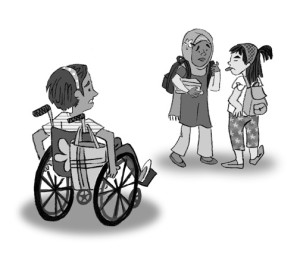|
|
August 19, 2014
After more than a year’s collaboration, our work on The Girls Q&A Book on Friendship is wrapping up. Illustrated by the ridiculously talented Erica DeChavez, my book for 8-12 year old girls, is coming next month from Electric Eggplant.
I’m super excited when I think about all the girls this book is going to help. Let’s face it, a new school year always brings friendship issues (aka social garbage.) The Girls’ Friendship Q&A Book is a cure for mean-girl behavior. (You’ve had enough of that, right?) With 50 questions from real girls (and answers that really solve the problem), plus tons of quizzes and awesome advice from older teens about how to be a Super-Friend, this book will teach you a whole lot about empathy and social courage. Something we can all use more of.
Sneak Peek from The Girls’ Friendship Q&A Book> Here’s one of the book’s fifty questions and answers:
A new girl from another country gets teased because she doesn’t speak English. I want to be nice to her, but I’m afraid people will tease me. Should I be her friend?
You already know the answer to your question, but you need some support. That’s why I’m here. Yes, you should be her friend! She has come from far away to a place that is very strange to her and she needs a friend. Imagine how you’d feel moving to some place that’s very different from what you’re used to. What would it be like not to understand what people are saying and to have no one understand you? She’s got a lot to deal with. Now imagine how she feels being teased. Having a friend like you could really help.
You say you’re worried the teasers might turn on you. They might. Or they might become friendlier to the new girl when you show them the way. You have the chance to do something important, and you are brave enough to do it.
Be kind. Show this girl that people in your country can be very welcoming. You’ll gain a new friend and learn amazing things about her and her culture.
Go for it and good luck!
*************
For updates on the publication of The Girls Q&A Book on Friendship, follow me on twitter and visit GirlsQandA.com
UPDATE October 4, 2014: The Girls Q&A Book on Friendship: 50 Ways to Fix a Friendship Without the DRAMA is now available in print and on Kindle (the ebook can be read on any device, your mobile phone, tablet, or computer with the free Kindle reader app). Visit GirlsQandA.com for an excerpt, reviews, and to order your copy.

March 25, 2014
 We can be mean to her and still be nice, can’t we? “Do unto others” makes no sense to middle schoolers. (Ideally it should, but that’s not how TweenWorld currently operates.) To help our kids navigate the turbulent and toxic waters of peer relationships, we’ve got to wake up and smell the reality stinking up their world (online and off).
Of course both girls and boys have middle school friendship woes. And yes, both boys and girls can become Peer Approval Addicts. But girls often take their feelings of hurt, jealousy, betrayal and rejection to dramatic and damaging heights. So let’s talk about girl friendships.
The social garbage girls throw at each other is the stuff of rumors, gossip, harassment, and exclusion. And it often happens under the radar. Because even though a girl may be eviscerating a former bff at school and online, she still wants to think of herself as a nice girl. (I said it was twisted, didn’t I?)
 50 Ways to Fix a Friendship without the DRAMA I wrote The Girls’ Q&A Book on Friendship for 8-12 year olds and the adults who care about them. Let’s face it, parents are rarely aware of what’s going on on the battlefield of their daughters’ friendships. It usually comes to light when their girl feels victimized and can no longer contain her distress. At that moment she may spill the whole story of her so-called friend’s bad behavior. In response a parent might logically advise:
“Tell her how you feel about this. Tell her she’s got to stop.”
“I can’t tell her that!”
“Why not? It’s true!”
“Because it will hurt her feelings!”
“Excuse me!? You won’t tell her she’s hurt you because you don’t want to hurt her feelings?! What about your feelings?”
“Forget about it, Mom/Dad. I’m sorry I said anything. You just don’t get it.”
Bingo! Parents can’t fathom the logic here. But to the girl, the logic is clear. She will swallow her pain because she (justifiably) fears that complaining about bad treatment will cause her friend and all the others in their friendship circle to ditch the plaintiff, swiftly and completely. Our targeted daughter will be friendless and she knows it. And because that is a fate worse than death she puts up with the ongoing abuse. Pretends it doesn’t hurt. Continues to think of these girls as her friends and continues to hang out with them and be abused.
Her confusion over the love-hate/comfort-pain mix may cloud her judgment when she starts dating. If she puts up with emotional abuse in a friendship why assume she’ll choose a thoughtful caring romantic partner over one who dominates, demeans and controls?
As parents we need to help our daughters develop enough self-respect to demand respectful treatment from others, especially those closest to them. Let’s help them acknowledge the truth of what’s going on in their friendships. We won’t be able to change “mean” girl behavior in others, but we can, at the very least, help our daughters acknowledge that their pain at the hands of friends is real, undeserved and unacceptable. Then we can point out their options:
1. Stay silent. Stick with friends who hurt you and expect more of the same.
2. Talk to them about it and let them know you’re no longer giving them permission to disrespect you. If nothing changes, consider option #3.
3. Take a (permanent) vacation from the drama. Reach out to people who share your values about what it means to be a real friend.
Here’s to Real Friends vs. the Other Kind and to less friendship drama!

January 30, 2014
It seems like we’re always swimming in social garbage – everything from the “just kidding” remarks from so-called friends to the snarky comments from people who hate you (online and off). When it comes to social garbage all of us have had it dumped on us. And all of us have dumped it on others. Weird thing, though, when I talk to students they all wish their school was a place where they could be accepted for who they are… without all that other crap.
So how do we get there from where we are now? How do we get everyone (including ourselves) to wake up and smell the garbage? This excerpt from my book, Teaching Kids to Be Good People, gives you some new ways to think about gossip, rumors and what it takes to clean up your act.
Don’t Add to the Garbage
 Hey, this is our park! Up our street lies Faudé Park. Undeveloped except for some narrow trails carved into the hill, this 13.5 acre community treasure offers a mini-retreat to everyone wandering through. When David and I first ventured up to Faudé’s highest point, we were delighted by the knockout view of Mt. Tamalpais. We were also depressed by the thick carpet of broken beer bottles tossed by partygoers who obviously enjoyed the “natural” environment. (A trashcan sits 20 feet from the peak. But hey, the ground’s handier, right?)
David and I aren’t neat freaks. Far from it. But we hated seeing all that glass in such a beautiful setting, so we started cleaning it up. The first day we spent 30 minutes picking up the biggest chunks of glass. When we returned a week later, new chunks replaced some of what we removed. But we weren’t deterred. Over the next several months, we kept picking up glass.
At some point things began to change. Weekend revelers stopped tossing bottles on the ground. Maybe because they could now see the ground! Or maybe the beauty of the park became apparent and now they decided it wasn’t cool to mess it up. Can’t say for sure, but whatever the reason, David and I were happy with the change and didn’t mind taking a little credit for getting things rolling in the right direction.
Turns out the trends we observed at the park reflect a bona fide sociological phenomenon called the broken windows theory. Apparently, the more rundown a neighborhood becomes, the more likely people will break windows in abandoned buildings, graffiti walls, and litter. The crime rate increases too. Conversely, when a neighborhood gets cleaned up, everything improves.
The turnaround at Faudé Park happened years ago, but I’m pleased to report that as of my walk this morning, the overlook is still totally free of garbage. Of course, not all garbage is equal, and the kind infecting most schools, aka social garbage, is of the invisible yet more toxic variety.
I frequently ask students: “If you walk into a room already littered with trash, is it OK to toss your candy wrapper on the floor?” Some kids will say, “Sure, it’s OK.” Why? Because “everyone else is doing it and you won’t get in trouble.”
Then I ask, “If the floor is clean, is it still OK to toss your trash?” Now most kids will say no. But a few kids are likely to let me know it’s never OK to add to the garbage. Which is when I switch the discussion from candy wrappers to rude comments, rumors, and the rest of the social garbage many kids slog through every day.
A school’s mission statement typically mentions something about respect and social responsibility. But how are schools teaching these values to their students? How are we, as parents, teaching them to our kids? We want them to grow into thoughtful, compassionate young adults who take time to think about their choices before they act, hopefully reflecting: “If I really want less garbage at school and at home, what can I do? Am I willing to watch my mouth and keep more hurtful comments to myself? Am I willing to stand up for someone being teased? Am I willing to speak out against demeaning ‘jokes’? Willing to sincerely apologize when I mess up and hurt someone? Willing to reach out to someone who needs a friend?”
As I see it, the goal of effective parenting (aside from keeping your kid alive and well), is to help him develop a code of ethics. If you want your child to become a good person whose actions demonstrate a high level of personal integrity, if you want her to help promote more friendship, peace, and justice in the world, you need a plan.
Character development is an ongoing process for each of us. We have to consistently work through all these issues with our kids and our students, our colleagues and our partners. Talk about ethical behavior where you see it and where you don’t. Model it in your own life. Help children evaluate their choices and learn from their mistakes. Help them deal with intense emotions in appropriate and responsible ways so they don’t intentionally hurt other people.
There are no easy answers here, but one thing is for sure, the world desperately needs less garbage.

November 21, 2013
The following post is an excerpt from my latest parenting book, Teaching Kids to Be Good People. You can read all of Chapter 1 right here.
 Life, bring on the lemons! Ever been up close and personal with a lemon tree and noticed how cool they are? I never had until I moved to California. Now I’ve got my own dwarf Meyer lemon and I can tell you that tree is an underrated miracle of nature. Right now, November 21st, it’s got teeny flower buds, heavenly smelling blossoms, baby green fruit, and ripe golden orbs, all at the same time. On a cosmic level, the lemon tree is constantly manifesting its entire life cycle, simultaneous living its past, present, and future! How cool is that?
One might assume straddling the time-space continuum causes internal conflict for the tree. Like maybe an undeveloped puny green guy eyes a juicy yellow beauty and gripes, “Damn! How come I’m not more mature?” Or some blossom whose petals flap in the wind, whines about how unfair it is that she’s no longer taut and firm like that sweet young bud over there. But noooo. The tree has evolved to a point where no phase of life is any better or worse than another. In the realm of lemon trees, there are no complaints, only total acceptance. What is, is. Lemon embraces all of it with equal acceptance and grace.
We humans on the other hand are hardwired for complaining. Even (maybe especially) those of us who have pretty soft lives compared to most folks on the planet. Adults often evaluate things in terms of what’s “wrong.” So how surprising is it that our kids frequently complain? The older they get, the more likely we are to find fault in what they do or fail to do! In addition to what we’re teaching them through negative modeling, teens are already incredibly judgmental. After all, they’re grappling with some key questions of their own:
Am I cool enough? Am I hot enough? Am I good enough?
The less confident they feel (from their own self-doubt and from the feedback piled on by their “friends” and parents), the more likely they are to complain. The more they complain, the more we complain about their complaining. Ugh.
Now I’m not advocating an all- Zen-all-the-time approach to living, where we make damn sure we never find fault with anything. That’s too tough to be practical. Besides there are certain situations that are inherently faulty. Like when the cottage cheese has gone off. No amount of Ohmmming is going to make me smile when I lift that lid and get a whiff. So yeah, life serves up plenty of unacceptable tidbits. When you’ve got one, just do something about it. Complaining is never a prerequisite for action. Nor is it a substitute.
When a family member presents us with something unacceptable, rather than exploding and losing control of mind and mouth, try this instead: “This cell phone bill of $1,000 is unacceptable. You will pay this, not me.” That’s not a complaint. That’s a simple directive. When we whine less and fill our sentences with more verbs (calls to action), we might get more cooperation and less complaining from our kids. At the same time, we are teaching them that a positive attitude helps us deal with life’s inconveniences more effectively than complaints.
On that positive note, I want to report that last week I picked all the ripe lemons from the tree and made lemon marmalade. Not to complain or anything, either the recipe was wrong or I misread it. Either way, the results were . . . uh . . . not edible. Fortunately the tree’s still got plenty of green babies. In another month or so, I’ll take another shot at it.
 — Older Posts »
| |
















